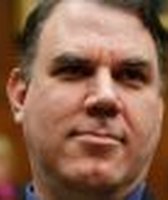Get PolitiFact in your inbox.

Republican presidential candidate Ted Cruz speaking during a campaign event in Newton, Iowa. (NYT)
Grayson wrongly says Cruz not an American
If Texas Sen. Ted Cruz wins the Republican presidential nomination, don’t expect Rep. Alan Grayson, D-Fla., to send flowers.
Grayson, a U.S. Senate candidate, has threatened to file a lawsuit the minute Cruz’s nomination is confirmed, saying Cruz can’t hold the office of president because he’s not an American.
Here’s the key exchange on Nov. 25, 2015, about Cruz between Grayson and Fox Radio host Alan Colmes.
Grayson: "Technically, he’s not even an American."
Colmes: "Well, his mother was born here, so I guess like Obama, though it’s interesting to me that the people who had a problem with Obama’s birth certificate don’t have a problem with Ted Cruz, who literally was born in another country and renounced his Canadian citizenry."
Grayson: "I don’t know. The Constitution says natural-born Americans, so now we’re counting Canadians as natural-born Americans? How does that work? I’m waiting for the moment that he gets the nomination and then I will file that beautiful lawsuit saying that he’s unqualified for the job because he’s ineligible."
Colmes: "So you’re saying should he get the nomination, Alan Grayson will file a lawsuit against his candidacy?"
Grayson: "Absolutely! Call me crazy, but I think the president of America should be an American."
Well, congressman, Cruz is an American by any definition. He travels on a U.S. passport. He's a member of the U.S. Senate, which requires him to be a citizen for nine years. There is no gray area on whether he is an American.
We pressed Grayson on whether he actually meant that Cruz is not an American and he raised the idea that his very citizenship, gained through his mother, is flawed.
Cruz’s citizenship
Cruz was born in Calgary, Alberta, on Dec. 22, 1970, to his Delaware-born mother Eleanor Darragh and Cuban-born father. If Darragh was an American, then under American law, Cruz was an American at birth.
Not so fast, warns Grayson. He challenges the premise that Darragh was an American when Cruz was born.
"Cruz’s father says that Cruz’s mother became a naturalized Canadian citizen," Grayson said through his spokesman Kevin Franck.
Grayson argues that under the U.S. Immigration and Nationality Act, there are two ways to lose your citizenship. You can become a naturalized citizen in another country or declare your allegiance to another nation.
"If Cruz’s mother did either of these two things before his birth, then she lost her nationality, and Cruz could not rely upon her nationality to claim U.S. citizenship," Grayson said.
The law isn't what Grayson says it is, which we'll get into in a moment. We asked Grayson to document that Darragh became a naturalized Canadian and he pointed us to a Web page that quotes an interview Cruz’s father gave to NPR. That interview actually does not support Grayson’s point. While Cruz’s father said he became a Canadian citizen, nowhere does he say that Darragh followed suit, much less that she did so before Cruz’s birth.
So there is no evidence to support the allegation. We asked Grayson if he had anything else, and his spokesman said he did not.
We asked the Cruz campaign to provide proof that Darragh remained an American citizen throughout her time in Canada, such as a residency document that she would need only if she were not a Canadian. They did not get back to us.
But according to several immigration lawyers we reached, even if she had taken the Canadian oath, her American citizenship might have been at risk, but she would not have lost it automatically.
In a pivotal 1967 decision, the U.S. Supreme Court ruled in the case of Afroyim vs. Rusk that a person only loses their citizenship if they specifically intend to give it up. Taking an oath of citizenship elsewhere doesn't qualify.
"Our holding does no more than to give to this citizen that which is his own, a constitutional right to remain a citizen in a free country unless he voluntarily relinquishes that citizenship," the justices wrote.
But there's a kicker when it comes to Canada. Henry Chang, an immigration lawyer and partner in the law firm of Blaney McMurtry in Toronto, told us that in 1970, the Canadian oath had this strong language:
Featured Fact-check
"I hereby renounce all allegiance and fidelity to any foreign sovereign or state of whom or which I may at this time be a subject or citizen."
A 1973 case in Canada led the country to drop that line. But until then, Chang said the original oath had the potential to impact Americans who adopted Canadian citizenship.
"If someone took the old form of the Canadian oath of naturalization prior to April 3, 1973, which included the renunciatory language, it is much easier for the U.S. government to prove that they committed the expatriating act with the intention of renouncing their U.S. citizenship," Chang said.
But that still wouldn’t automatically cost Darragh her citizenship. Chang and Lenni Benson, an immigration law professor at New York Law School, said that it’s up to the U.S. government to press the point.
"If the government never challenged Sen. Cruz’s mother, it is very unlikely that the act of naturalizing in Canada formally would have caused her to lose her citizenship," Benson said.
Chang amplified this point in an article on loss of citizenship. Chang noted that a 1980 Supreme Court ruling (Vance vs. Terrazas), and amendments to the Immigration and Nationality Act in 1986 declared that intent could not be assumed. The ruling and the law put the onus squarely on the government to prove that the person truly intended to renounce his or her citizenship.
In legal parlance, giving up your citizenship is called an expatriating act. In 1990, the U.S. State Department issued this policy: "The Department has adopted an administrative presumption that a person intends to retain U.S. citizenship when he or she commits a potentially expatriating act." (An example of a potentially expatriating act would be becoming a citizen of another country.)
In short, as a matter of law and policy, in the eyes of the law, taking an oath elsewhere does not automatically cost you your American citizenship.
In 1988, Congress essentially shut the door on anyone who might want to go back and challenge someone’s citizenship before all these changes took effect. In a set of technical corrections to the 1986 amendments, it said the new law applied to actions that took place before 1986.
The facts on the ground speak for themselves. When Cruz was about four, his parents moved to Texas. There is no evidence that the U.S. government ever challenged Darragh’s citizenship. It has always accepted Cruz as an American, based on his mother’s status. To go back and revisit Darragh’s status would put the government in the position of arguing a weak case that runs against a 25-year-old policy.
A final note: Technically, Cruz was a dual-national, but to put the issue to rest, he formally renounced any claim to Canadian citizenship in May 2014.
What it takes to be president
Grayson also spoke about the constitutional requirement for a president to be a "natural-born citizen."
We’ve looked at this before and the evidence falls heavily against Grayson’s position. The only sliver of uncertainty? There’s no Supreme Court ruling on this question.
Most legal experts contend a "natural born citizen" means someone is a citizen from birth and doesn’t have to go through a naturalization process to become a citizen. Cruz has said he never went through that process.
The Congressional Research Service, the agency tasked with providing authoritative research to all members of Congress, published a report after the 2008 election supporting the thinking that "natural born" citizenship means citizenship held "at birth."
There are many legal and historical precedents to strongly back up this argument. Two former solicitor generals of opposing parties, Neal Katyal and Paul Clement, who worked for Presidents Barack Obama and George W. Bush, respectively, laid this out in an op-ed in the Harvard Law Review.
In general, a child born with at least one American parent can claim citizenship regardless of where the birth took place. Grayson questions this, but that challenge has been rebuffed before. Sen. John McCain, R-Ariz., faced questions about his eligibility because he was born in the Panama Canal Zone while his father was stationed there. That did not prevent him from running as the GOP nominee in 2008.
Despite this legal consensus, the fact remains that Supreme Court has never ruled on this matter and until it does, Cruz’s eligibility remains -- theoretically -- a slightly open question.
Several citizens filed lawsuits asking the court to rule on whether McCain was a natural born citizen early in 2008, but the legal challenges didn’t go anywhere. Judges ruled that the plaintiffs had no standing to sue, a problem that Grayson would also face if he tried.
Sarah Duggin, a professor of law at Catholic University who has researched this issue extensively, has said the courts would likely see this as a political matter over which they have no jurisdiction.
Our ruling
Grayson said that Cruz is ineligible to be president because "technically" he’s not American.
The suggestion that Cruz isn’t an American is patently wrong. He gained his citizenship through his American mother the moment he was born. Cruz holds a U.S. passport and is a duly elected member of the U.S. Senate. While Grayson alleges that Cruz’s mother had lost her American citizenship while in Canada, the source he cited provided no evidence.
Grayson provided no proof that Cruz’s mother had become a Canadian citizen. Even if she had, under current law and policy she would still be an American. And so, too, would Cruz.
We rate this statement Pants on Fire.
Our Sources
Fox News, Grayson: I’ll File A Lawsuit Against Ted Cruz If He’s The Nominee, Nov. 25, 2015
Scribd, Cruz Citizenship Timeline (documented), Feb. 20, 2015
NPR, How Ted Cruz's Father Shaped His Views On Immigration, June 20, 2013
U.S. State Department, Dual Nationality
Canadian Legal Information Institute, Citizenship Act - RSC 1985
Government of Canada, History of citizenship legislation, June 7, 2015
Henry Chang, Loss of Citizenship and Dual Nationality, 2011
U.S. State Department, Developing a loss-of-nationality case, Feb. 24, 2015
Boston University Law Review, Natural Born in the U.S.A.: The Striking Unfairness and Dangerous Ambiguity of the Constitution’s Presidential Qualifications Clause and Why We Need to Fix It, 2005
Congressional Research Service, "Qualifications for President and the 'Natural Born' Citizenship Eligibility Requirement," Nov. 14, 2011
Harvard Law Review, "On the Meaning of 'Natural Born Citizen,' " March 11, 2015
U.S. Citizenship and Immigration Services, Citizenship Through Parents
Email interview, Kevin Franck, spokesman, Grayson for Senate, Dec. 4, 2015
Interview, Lenni Benson, professor of law, New York Law School, Dec. 4, 2015
Interview, Henry Chang, partner, Blaney McMurtry, Dec. 4, 2015
Interview, David Leopold, principal, David Wolfe Leopold and Associates, Dec. 4. 2015
Interview, Sarah Duggin, professor of law, Columbus School of Law, Catholic University, Dec. 2, 2015
Browse the Truth-O-Meter
More by Jon Greenberg
Grayson wrongly says Cruz not an American
Support independent fact-checking.
Become a member!
In a world of wild talk and fake news, help us stand up for the facts.
























































